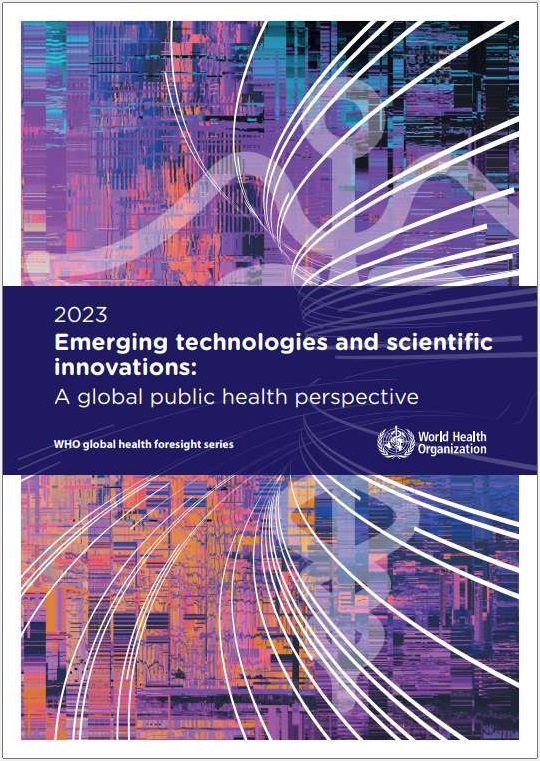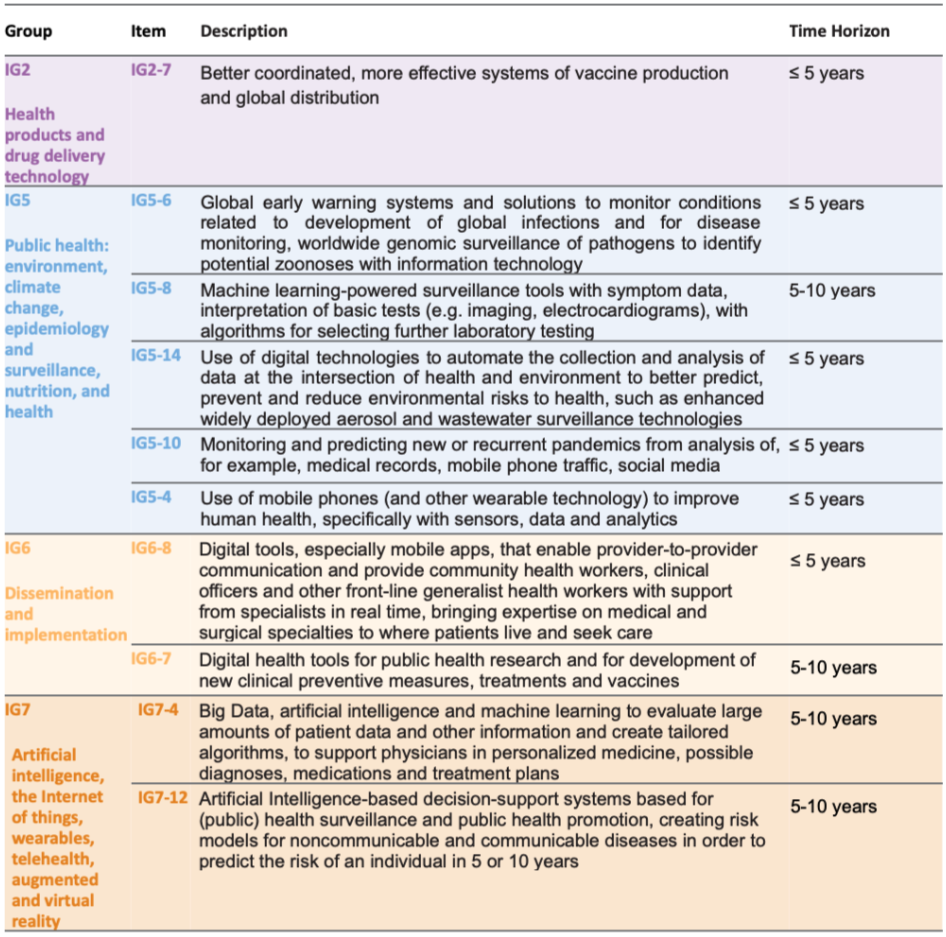WHO Releases Report on Emerging Technologies and Scientific Innovations
 Noam Arzt
Noam ArztIn early July 2023, the World Health Organization (WHO) issued its 2023 report on Emerging Technologies and Scientific Innovations: A Global Public Health Perspective. This insightful and detailed report is the result of strategic engagement with a panel of global health experts through the use of an online Delphi method, roundtable discussions, and key informant interviews. The purpose of this report is to identify innovations in research and emerging technologies that have the potential to impact global health in the next five to ten years.
 The report itself is nearly 100 pages (with appendices) and is packed with so much information as to be overwhelming. It is well organized and makes good use of charts and diagrams so that helps the reader to get a good sense of the innovations that are the most promising. WHO convened eight “innovation groups” and then summarized the items considered to have the highest impact and highest chance of adoption. The text of the report has detailed descriptions of each of these innovations, as well as all the other innovations in each group, including a nice chart that plots them all based on their potential impact and chance of adoption; the ones that rate “high” on both scales rose to the surface. I tried to focus on data management strategies, and those most closely related to public health practice and extracted the following subset of key innovations.
The report itself is nearly 100 pages (with appendices) and is packed with so much information as to be overwhelming. It is well organized and makes good use of charts and diagrams so that helps the reader to get a good sense of the innovations that are the most promising. WHO convened eight “innovation groups” and then summarized the items considered to have the highest impact and highest chance of adoption. The text of the report has detailed descriptions of each of these innovations, as well as all the other innovations in each group, including a nice chart that plots them all based on their potential impact and chance of adoption; the ones that rate “high” on both scales rose to the surface. I tried to focus on data management strategies, and those most closely related to public health practice and extracted the following subset of key innovations.
Many of these innovations can be leveraged now or within five years. The report identified some interesting technological enablers and the top five were:
 These items track very nicely with the issues we have been writing about. Public health – in part spurred by the COVID-19 pandemic – has been working hard to deploy data warehouses and data lakes fed by operational systems to serve the reporting, visualization and analysis needs of the agencies and the public. Cloud computing has become a major component of this new infrastructure, just one part of a broader health information technology infrastructure that agencies are trying to put in place through efforts guided by CDC’s Data Modernization Initiative (DMI).
These items track very nicely with the issues we have been writing about. Public health – in part spurred by the COVID-19 pandemic – has been working hard to deploy data warehouses and data lakes fed by operational systems to serve the reporting, visualization and analysis needs of the agencies and the public. Cloud computing has become a major component of this new infrastructure, just one part of a broader health information technology infrastructure that agencies are trying to put in place through efforts guided by CDC’s Data Modernization Initiative (DMI).
These efforts are currently being threatened by funding cuts being imposed by the Federal government as part of the Spring 2023 debt ceiling increase negotiations. Artificial Intelligence (AI) still has a ways to go in public health, though machine learning shows more short-term promise. Agencies have been working harder to improvise the capture of data at the source – usually, clinical care sites – and the promulgation of interoperability standards as well as more consistent terminology and coding of data continues to help. Finally, open source can help agencies keep costs in check.
 The report goes on to identify skill and capacity-building enablers, structural, legal, and political enablers, as well as cultural enablers. Finally, a number of common and potential risks were identified. The report concludes with a short discussion and conclusion which stress that this document represents a moment in time only and needs to be refreshed periodically as advances are made.
The report goes on to identify skill and capacity-building enablers, structural, legal, and political enablers, as well as cultural enablers. Finally, a number of common and potential risks were identified. The report concludes with a short discussion and conclusion which stress that this document represents a moment in time only and needs to be refreshed periodically as advances are made.
This post was first published in the HLN Blog. It is reprinted by Open Health News with permission. The original post can be found here.
- Tags:
- 2023 report on Emerging Technologies and Scientific Innovations
- artificial intelligence (AI)
- capture of data at the source
- CDC
- clinical care sites
- Cloud Computing
- COVID-19 pandemic
- data lakes
- data management strategies
- Data Modernization Initiative (DMI)
- data warehouses
- emerging technologies
- funding cuts being imposed by the Federal government
- global health
- health information technology infrastructure
- interoperability standards
- key informant interviews
- machine learning
- online Delphi method
- open health
- open source
- Open Source Platforms
- panel of global health experts
- public health
- public health practice
- roundtable discussions
- technological enablers
- World Health Organization (WHO)
- Login to post comments